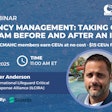
The PHTA has issued the following summary of the Executive Orders issued by states affecting the pool and spa industry:
COVID-19: State Action Highlights Updated March 23, 2020, 2:00 p.m. ET
Many states and local jurisdictions have or are in the process of issuing directives affecting employers and various business establishments. The information below is intended as a general guide to Executive Orders of certain states. The information is by no means complete or up to the moment, as it is impossible to keep abreast of edicts from 50 states and hundreds of counties or cities.
By accessing this document you are agreeing that 1) the document does NOT constitute legal advice, 2) that neither PHTA nor its employees, retained professionals or volunteer members are liable in any way for any inaccuracies or errors in this document, or for any damages allegedly incurred as a result of any claimed reliance on this document.
ALL MEMBERS ARE ADVISED TO SEEK THEIR OWN LEGAL COUNCIL AND/OR SPECIFIC GUIDANCE FROM THE APPROPRIATE GOVERNMENT AUTHORITY
Overview
With the number of reported infections increasing, states have begun issuing orders restricting various activities to mitigate against further spread of the Coronavirus. While each state (and in some cases each county or city) decree must be reviewed by the affected business for its specific prohibitions and exclusions, there are some similarities and patterns worth noting.
First, most states by now have mandated some restrictions on public gatherings, including banning all gatherings over a certain number of people, closing bars, closing or restricting the number of patrons in eating establishments, closing parks, water parks, public beaches, spas, gyms, etc. These orders, as well as the more restrictive orders discussed below, are invariably issued by the Governor’s office.
In addition, a number of states have now issued what is often referred to as “Stay at Home” Orders or the equivalent. These orders typically address:
1. Workplaces
2. Retail establishments
Some orders address one or the other. Most address both. In each category, however, the orders identify a number of exemptions or exclusions for what is determined to be “essential” businesses or services.
While those exclusions are usually listed in the order itself, in some cases, this task has been left to the applicable state agency, which may be the Department of Health (OH), the Office of Economic Development (NY), etc.
Other states, such as CA, simply refer to the United States Cybersecurity and Infrastructure Security Agency (CISA) Memorandum on Identification of Essential Critical Infrastructure Workers During Covid-19 Response.
PHTA has provided a copy of this memorandum in previous communications to our members that highlight key provisions under which we believe segments of our industry may fall.
To provide guidance and help you and your company navigate COVID-19, make sure to visit our Coronavirus webpage.
If you have any questions, please reach out to [email protected].
EXCLUSIONS
While the list of exclusions does vary, there are some patterns worth noting.
FIRST
Most Orders exclude construction work, as well as skilled trades, such as electrical and plumbing. (NOTE: In some states, pool contractors are licensed under “plumbing.”)
SECOND
Most Orders contain exceptions for maintenance and sanitization of residences, as well as business facilities that are allowed to remain open.
As explained in our memo for Elected Officials, “The pool and hot tub industry professionals are responding to the dynamic situation and aggressively moving to ensure that the business of maintaining clean, safe and healthy recreational bodies of water does not enable the spread of COVID-19 or waterborne pathogens such as Pseudomonas, Cryptosporidium, E. Coli, Shigella, etc. as well as ancillary diseases (Zika Virus, West Nile Virus, etc.).
We firmly believe the companies that supply pool sanitization and disinfection materials (through manufacturing, distribution or retail stores), the companies that manage the maintenance of swimming pools, hot tubs and other artificial bodies of water and the companies currently constructing inground pools and spas are essential to preventing the transmission of infectious diseases, helping maintain community health, and ensuring public safety.
These efforts will avoid creating additional vectors for the spread of this virus and/or other complicating diseases which might compound the challenges currently facing our health care infrastructure.”
THIRD
Some states specifically exempt chemical manufacturing.
FOURTH
A number of states exempt distribution and warehousing.
FIFTH
Where retail closures have been ordered, exemptions have often been established for “hardware” and/or “home improvement,” as well as for retail necessary to support other essential infrastructure or services, such as sanitization, or contractors.
At PHTA we are working tirelessly to keep up with the rapidly changing landscape. Here is a useful link summarizing recent state activity. We are also providing brief summaries for some of the more populous and aggressive states to date. This document will be updated periodically, and we will tell you when it was last updated.
We cannot, however, provide you with legal advice. Please consult your own attorney, who will be more familiar with your specific business and jurisdictions. You can also contact the applicable agencies for more information or clarification. Several states have already established a link/portal to request designation or information. Take advantage of those as much as possible.
STATE ORDERS
CALIFORNIA
California references the U.S. CISA guidance as it relates to critical provisions applicable to the pool and spa industry by the:
- PUBLIC WORKS: “Workers such as plumbers, electricians, exterminators, and other service providers who provide services that are necessary to maintaining the safety, sanitation, and essential operation of residences.”
- PUBLIC HEALTH: “Manufacturers....warehouse operators, and distributors of...cleaning, sanitizing, disinfecting or sterilization supplies...”
- WATER AND WASTERWATER: “Chemical disinfectant suppliers for...personnel protection.”
- CRITICAL MANUFACTURING: “Workers necessary for the manufacturing of materials and products needed for...chemical manufacturing...”
- CHEMICAL:
“Workers supporting the chemical supply chains...including workers at chemical manufacturing plants...workers at distribution facilities...”
“Workers who support the production and transportation of chlorine...and prevents the contamination...of water.”
California and many county orders also provide clear language that construction workers who support the construction, operation, inspection and maintenance of construction sites and construction projects (including housing construction) are essential.
CONNECTICUT
The order directs all non-essential businesses and not-for-profit entities in Connecticut to prohibit all in-person functions if they are able to, effective Monday, March 23, 2020 at 8 p.m. The governor is encouraging all businesses to employ, to the maximum extent possible, any telecommuting or work-from-home procedures that they can safely implement.
Connecticut appears to be following the federal (US CISA memo) guidance. View the Overview of the State Order. Below is a list of potentially relevant exemptions for essential businesses. Note that pool service and maintenance and construction are specifically exempt.
1. Essential workers in the 16 Critical Infrastructure Sectors, as defined by the federal Department of Homeland Security unless otherwise addressed in a prior or future executive order pertaining to the existing declared public health and civil preparedness emergency.
4. All manufacturing and corresponding supply chains, including aerospace, agriculture, and related support businesses
5. Retail including:
- appliances, electronics, computers, and telecom equipment
- big-box stores or wholesale clubs, provided they also sell groceries, consumer health products, or operate a pharmacy
- convenience stores
- gas stations
- grocery stores including all food and beverage retailers
- guns and ammunition
- hardware, paint, and building material stores, including home appliance sales/repair
- liquor/package stores and manufacturer permittees
- pharmacies
- pet and pet supply stores
7. Services including:
- accounting and payroll services
- animal shelters or animal care or management, including boarding, grooming, pet walking and pet sitting
- auto supply, repair, towing, and service, including roadside assistance
- bicycle repair and service
- building cleaning and maintenance
- child care services
- critical operations support for financial institutions
- financial advisors
- financial institutions, including banks, credit unions, and check cashing services
- funeral homes, crematoriums, and cemeteries
- insurance companies
- laundromats/dry cleaning
- legal and accounting services
- mail and shipping services
- marinas and marine repair and service
- news and media
- real estate transactions and related services, including residential leasing and renting
- religious services (subject to Executive Order 7D limiting gatherings to 50 people)
- storage for Essential Businesses
- trash and recycling collection, hauling, and processing
- warehouse/distribution, shipping, and fulfillment
9. Construction including:
- all skilled trades such as electricians, HVAC, and plumbers
- general construction, both commercial and residential
- other related construction firms and professionals for essential infrastructure or for emergency repair and safety purposes
- planning, engineering, design, bridge inspection, and other construction support activities
10. Services necessary to maintain the safety, sanitation and essential operations of all residences and other buildings (including services necessary to secure and maintain non-essential workplaces):
- building cleaners or janitors
- building code enforcement
- disinfection
- doormen
- emergency management and response
- fire prevention and response
- general maintenance whether employed by the entity directly or a vendor
- home-related services, including real estate transactions, closings, appraisals, and moving services
- landscaping services
- law enforcement
- outdoor maintenance, including pool service!!
- pest control services
- security and maintenance, including steps reasonably necessary to secure and maintain non-essential businesses
- state marshals
DELAWARE
Relevant examples of essential businesses include:
- Contracting, including residential construction.
- Virtually all manufacturing
- Personal and household repair
- General trucking
- Architectural and engineering
FLORIDA
At this time the executive orders applying statewide are limited and do not affect the pool & spa industry. Florida is leaving much of this to the locals to determine. Two Florida counties have thus far issued Shelter-in-Place orders: Broward and Miami-Dade use the same language for what is classified as an essential business.
Relevant exemptions for the Broward Order include the following:
i. Contractors and other tradesmen...other service providers who provide services that are necessary to maintaining the safety, sanitation, and essential operation of residences and other structures
u. Landscape and pool care business, including residential landscape and pool care services
bb. Open construction site, irrespective of the type of building
dd. manufacturing facilities...other industrial distribution and supply chain facilities used for essential products...
Pool service, construction and distribution for supplies (if not dealing with the public) are all considered essential.
SUMMARY:
Pool service and construction essential, retail and distribution essential with limits on social distancing, manufacturing of essential products also appear to be covered.
ILLINOIS
Section 1, Number 9 exempts:
essential infrastructure, which includes construction, building management and waste, distribution centers. The term essential infrastructure is to be interpreted broadly.
Section 1, Number 12 exempts:
a. “stores…that sell products necessary to maintaining the safety, sanitation, and essential operation of residences…..”
j. Hardware and home improvement
k. Critical trades including building and construction tradesmen and tradeswomen.
LOUISIANA
Louisiana offers the following provisions:
- permits travel to and from work provided workplace is not ordered closed
- contractors, retailers not ordered closed. (however, if in a mall, retail establishment must only permit access from outside).
MARYLAND
Maryland has provided Interpretative Guidance that follows the U.S. CISA Guidance (See discussion on California above). The Maryland guidance also specifically says:
The list in #2 above is non-exhaustive. The fact that a particular business, organization, or facility is not included in the list does not mean it is excluded from the federal critical infrastructure sectors. Please consult https://www.cisa.gov/identifying-critical-infrastructure-during-covid-19 for additional guidance about what is and is not included in the federal critical infrastructure sectors
MICHIGAN
Michigan is also following the U.S. CISA Guidance (See discussion on California above).
NEW JERSEY
Number 2: All New Jersey residents shall remain home or at their place of residence unless they are 1) obtaining goods or services from essential retail businesses, as described in Paragraph 6; 2) obtaining takeout food or beverages from restaurants, other dining establishments, or food courts, pursuant to Paragraph 8; 3) seeking medical attention, essential social services, or assistance from law enforcement or emergency services; 4) visiting family or other individuals with whom the resident has a close personal relationship, such as those for whom the individual is a caretaker or romantic partner; 5) reporting to, or performing, their job; 6) walking, running, operating a wheelchair, or engaging in outdoor activities with immediate family members, caretakers, household members, or romantic partners while following best social distancing practices with other individuals, including staying six feet apart; 7) leaving the home for an educational, religious, or political reason; 8) leaving because of a reasonable fear for his or her health or safety; or 9) leaving at the direction of law enforcement or other government agency.
Number 6: The brick-and-mortar premises of all non-essential retail businesses must close to the public as long as this Order remains in effect. Essential retail businesses, listed below, are excluded from this directive and may remain open during their normal business hours. Essential retail businesses must, wherever practicable, provide pickup services outside or adjacent to their stores for goods ordered in advance online or by phone. Additionally, online and telephonic delivery services are permitted to the extent the retail business is authorized to operate an online or telephonic delivery service under existing law. The State Director of Emergency Management, who is the Superintendent of the State Police, shall have the discretion to make additions, amendments, clarifications, exceptions, and exclusions to this list:
a. Grocery stores, farmer’s markets and farms that sell directly to customers, and other food stores, including retailers that offer a varied assortment of foods comparable to what exists at a grocery store;
b. Pharmacies and alternative treatment centers that dispense medicinal marijuana;
c. Medical supply stores;
d. Retail functions of gas stations;
e. Convenience stores;
f. Ancillary stores within healthcare facilities;
g. Hardware and home improvement stores;
h. Retail functions of banks and other financial institutions;
i. Retail functions of laundromats and dry-cleaning services;
j. Stores that principally sell supplies for children under five years old;
k. Pet stores;
l. Liquor stores;
m. Car dealerships, but only to provide auto maintenance and repair services, and auto mechanics;
n. Retail functions of printing and office supply shops; and
o. Retail functions of mail and delivery stores.
Number 10: All businesses or non-profits in the State, whether closed or open to the public, must accommodate their workforce, wherever practicable, for telework or work-from-home arrangements. For purposes of this order, “telework” means the practice of working from home or alternative locations closer to home through the use of technology that equips the individual to access necessary materials.
Number 11: To the extent a business or non-profit has employees that cannot perform their functions via telework or work-from-home arrangements, the business or non-profit should make best efforts to reduce staff on site to the minimal number necessary to ensure that essential operations can continue. Examples of employees who need to be physically present at their work site in order to perform their duties include, but are not limited to, law enforcement officers, fire fighters, and other first responders, cashiers or store clerks, construction workers, utility workers, repair workers, warehouse workers, lab researchers, information technology maintenance workers, janitorial and custodial staff, and certain administrative staff.
SUMMARY
- Residents may leave home to report to work where physical presence is necessary under par 11. This includes construction workers, repair workers and warehouse workers.
- Only those establishments listed as exceptions under section 6 may remain open. Hardware and Home Improvement Stores may remain open.
NEW YORK
Closes all places of employment except for non-essential services.
Guidance has been issues defining essential services
Request designation as an essential business
For purposes of Executive Order 202.6, "Essential Business" means:
3. Essential Manufacturing, including:
- food processing, manufacturing agents, including all foods and beverages
- chemicals
- medical equipment/instruments
- pharmaceuticals
- sanitary products
- telecommunications
- microelectronics/semi-conductor
- agriculture/farms
- household paper products
4. Essential Retail, including:
- grocery stores including all food and beverage stores
- pharmacies
- convenience stores
- farmer's markets
- gas stations
- restaurants/bars (but only for take-out/delivery)
- hardware and building material stores
5. Essential Services, including:
- trash and recycling collection, processing and disposal
- mail and shipping services
- laundromats
- building cleaning and maintenance
- child care services
- auto repair
- warehouse/distribution and fulfillment
- funeral homes, crematoriums and cemeteries
- storage for essential businesses
- animal shelters
9. Construction, including:
- skilled trades such as electricians, plumbers
- other related construction firms and professionals for essential infrastructure or for emergency repair and safety purposes
11. Essential Services Necessary to Maintain the Safety, Sanitation and Essential Operations of Residences or Other Essential Businesses, Including:
- law enforcement
- fire prevention and response
- building code enforcement
- security
- emergency management and response
- building cleaners or janitors
- general maintenance whether employed by the entity directly or a vendor
- automotive repair
- disinfection
SUMMARY
Essential services include:
1. Hardware and Home Improvement Stores
2. Building Cleaning and Maintenance
3. Warehousing and Distribution
4. Skilled trades such as plumbing and electric
OHIO
Number 9:
Exempts essential infrastructure, which Includes construction, building management and waste, distribution centers. The term essential infrastructure is to be interpreted broadly.
Number 12:
Exempts:
a. “stores…that sell products necessary to maintaining the safety, sanitation, and essential operation of residences…..”
j. Hardware and home improvement
k. Critical trades including building and construction tradesmen and tradeswomen.










































